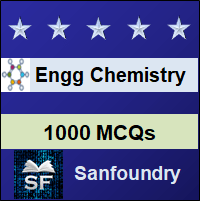
Engineering Chemistry - I Multiple Choice Questions Highlights
- 1000+ Multiple Choice Questions & Answers (MCQs) in Engineering Chemistry - I with a detailed explanation of every question.- These MCQs cover theoretical concepts, true-false(T/F) statements, fill-in-the-blanks and match the following style statements.
- These MCQs also cover numericals as well as diagram oriented MCQs.
- These MCQs are organized chapterwise and each Chapter is futher organized topicwise.
- Every MCQ set focuses on a specific topic of a given Chapter in Engineering Chemistry - I Subject.
Who should Practice Engineering Chemistry - I MCQs?
– Students who are preparing for college tests and exams such as mid-term tests and semester tests on Engineering Chemistry - I.- Students who are preparing for Online/Offline Tests/Contests in Engineering Chemistry - I.
– Students who wish to sharpen their knowledge of Engineering Chemistry Subject.
- Anyone preparing for Aptitude test in Engineering Chemistry.
- Anyone preparing for interviews (campus/off-campus interviews, walk-in interview and company interviews).
- Anyone preparing for entrance examinations and other competitive examinations.
- All - Experienced, Freshers and College / School Students.
Engineering Chemistry - I Chapters
Here's the list of chapters on the "Engineering Chemistry - I" subject covering 100+ topics. You can practice the MCQs chapter by chapter starting from the 1st chapter or you can jump to any chapter of your choice.- Atoms to Molecules to Material’s for Engineers
- Structure and Stereostructure of Molecules
- Materials and their Properties
- Methods of Purification
- Criteria of Purity and Characterisation of Materials
- Absorption Spectroscopy
- Reactivity of Molecules Reaction Mechanism
- Reaction Dynamics
- Phase Rule
- Thermodynamics Equilibrium and Kinetics
- Photochemistry
- Polymers
1. Atoms to Molecules to Material’s for Engineers
The section contains multiple choice questions and answers on hybridisation, homonuclear and heteronuclear molecules, molecular orbital and valence bond Theory.
|
|
|
2. Structure and Stereostructure of Molecules
The section contains questions and answers on chirality, stereoselectivity and stereospecificity, optical Isomerism and r, s- configuration and water softening.
|
|
|
3. Materials and their Properties
The section contains MCQs on Engineering, Construction and functional materials, molecular aggregation, micelles and nanotechnology.
|
|
|
4. Methods of Purification
The section contains multiple choice questions and answers on crystallisation, surface tension, fractional and steam distillation, chromatography, column and thin layer chromatography.
|
|
|
5. Criteria of Purity and Characterisation of Materials
The section contains questions and answers on melting and boiling point, conductivity, particle size measurement and viscosity.
|
|
|
6. Absorption Spectroscopy
The section contains MCQs on origin of spectrum, molecular, vibrational and electronic spectroscopy.
|
|
|
7. Reactivity of Molecules Reaction Mechanism
The section contains multiple choice questions and answers on inductive, electromeric and mesomeric effect, hyperconjugation, carbocations and carbanions, nucleophillic and electrophilic substitution reactions.
8. Reaction Dynamics
The section contains questions and answers on order and molecularity of a reaction, effect of temperature, integrated rate reaction and catalysis.
|
|
|
9. Phase Rule
The section contains MCQs on gibbs phase rule, phase rule applications, uses and its limitations, phases, components, one and two component systems.
|
|
|
10. Thermodynamics Equilibrium and Kinetics
The section contains multiple choice questions and answers on thermodynamics laws, internal energy, enthalpy, entropy, equilibrium, carnot cycle, clapeyron clausius equation, gibbs and helmholtz free energy, metastable equilibrium and kinetics.
|
|
|
11. Photochemistry
The section contains questions and answers on photochemical reactions types and also its mechanism, photochemistry laws, quantum efficiency, photosynthesis, vision photochemistry, high and low quantum yields, photochemical studies apparatus, photochemistry applications and bioenergetics.
|
|
|
12. Polymers
The section contains MCQs on polymer classification and its characterisation, polymer blends, dendrimers, thermoplastic polymers, elastomers, fibers, organic conducting and biodegradable polymers.
Wish you the best in your endeavor to learn and master Engineering Chemistry - I!
